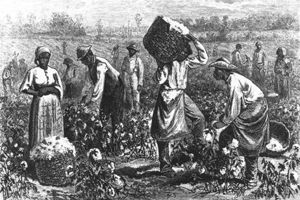 Today the informal emancipation of southern slaves begins, in the form of the United States’ Act to Confiscate Property used for Insurrectionary Purposes. While not mentioning slavery specifically, the Act approved by the President and passed by the Congress gives Union armies the power to confiscate the property of southerners – including slaves, the most valuable of southern property. From this point forward, slaves near battlefronts begin fleeing to Union lines in earnest, seeking freedom. While the Union’s treatment of confiscated southern slaves is uneven, the march to a formal Emancipation Act has begun.
Today the informal emancipation of southern slaves begins, in the form of the United States’ Act to Confiscate Property used for Insurrectionary Purposes. While not mentioning slavery specifically, the Act approved by the President and passed by the Congress gives Union armies the power to confiscate the property of southerners – including slaves, the most valuable of southern property. From this point forward, slaves near battlefronts begin fleeing to Union lines in earnest, seeking freedom. While the Union’s treatment of confiscated southern slaves is uneven, the march to a formal Emancipation Act has begun.
Baptist slaveholders, like other slaveholders, in the coming months keep a close eye on their chattel. Slaveholders in the Upper South are especially alert, as Union armies are nearby. Through the duration of the war, prominent Southern Baptists such as Samuel Boykin will spend much time defending the righteousness of African slavery, even as slaves, when opportunity affords, leave their masters to never return.
This first Confiscation Act reads:
Be it enacted by the Senate and House of Representatives of the United States of America in Congress assembled, That if, during the present or any future insurrection against the Government of the United States, after the President of the United States shall have declared, by proclamation, that the laws of the United States are opposed, and the execution thereof obstructed, by combinations too powerful to be suppressed by the ordinary course of judicial proceedings, or by the power vested in the marshals by law, any person or persons, his, her, or their agent, attorney, or employé, shall purchase or acquire, sell or give, any property of whatsoever kind or description, with intent to use or employ the same, or suffer the same to be used or employed, in aiding, abetting, or promoting such insurrection or resistance to the laws, or any person or persons engaged therein; or if any person or persons, being the owner or owners of any such property, shall knowingly use or employ, or consent to the use or employment of the same as aforesaid, all such property is hereby declared to be lawful subject of prize and capture wherever found; and it shall be the duty of the President of the United States to cause the same to be seized, confiscated, and condemned.
SEC. 2. And be it further enacted, That such prizes and capture shall be condemned in the district or circuit court of the United States having jurisdiction of the amount, or in admiralty in any district in which the same may be seized, or into which they may be taken and proceedings first instituted.
SEC. 3. And be it further enacted, That the Attorney-General, or any district attorney of the United States in which said property may at the time be, may institute the proceedings of condemnation, and in such case they shall be wholly for the benefit of the United States; or any person may file an information with such attorney, in which case the proceedings shall be for the use of such informer and the United States in equal parts.
SEC. 4. And be it further enacted, That whenever hereafter, during the present insurrection against the Government of the United States, any person claimed to be held to labor or service under the law of any State, shall be required or permitted by the person to whom such labor or service is claimed to be due, or by the lawful agent of such person, to take up arms against the United States, or shall be required or permitted by the person to whom such labor or service is claimed to be due, or his lawful agent, to work or to be employed in or upon any fort, navy yard, dock, armory, ship, entrenchment, or in any military or naval service whatsoever, against the Government and lawful authority of the United States, then, and in every such case, the person to whom such labor or service is claimed to be due shall forfeit his claim to such labor, any law of the State or of the United States to the contrary notwithstanding. And whenever thereafter the person claiming such labor or service shall seek to enforce his claim, it shall be a full and sufficient answer to such claim that the person whose service or labor is claimed had been employed in hostile service against the Government of the United States, contrary to the provisions of this act.
APPROVED, August 6, 1861.
Source (link)


